#Colonel Pickering
Text

My Fair Lady Reboot Casting Fancast:
Eliza Doolittle: Emily Blunt

Professor Henry Higgins: Hugh Jackman


Colonel Pickering: Colin Firth
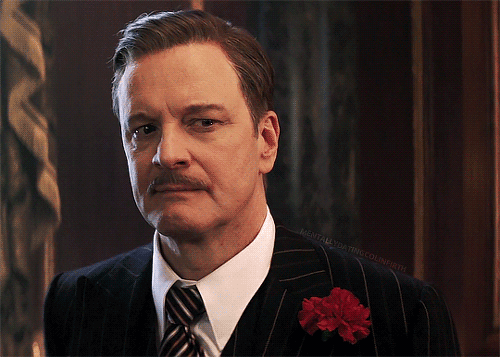

Freddy Eynsford-Hill: Luke Evans


#my fair lady#eliza doolittle#emily blunt#professor henry higgins#hugh jackman#colonel pickering#colin firth#freddy eynsford hill#luke evans#musicals
3 notes
·
View notes
Text
Unveiling Social Constructs: A Review of "Pygmalion" by Bernard Shaw

Bernard Shaw's "Pygmalion" is a thought-provoking play that transcends time, weaving together themes of class, identity, and societal expectations with wit, humor, and insight. First performed in 1913, the play follows the transformative journey of Eliza Doolittle, a Cockney flower girl, who becomes the subject of a bet between the phonetics professor Henry Higgins and Colonel Pickering. As Higgins attempts to mold Eliza into a refined lady through speech lessons, "Pygmalion" explores the intricacies of language, social mobility, and the power dynamics inherent in class distinctions.
At its core, "Pygmalion" challenges the notion of fixed social hierarchies and underscores the arbitrary nature of class distinctions. Shaw deftly exposes the absurdity of equating social status with inherent worth, presenting characters whose true value lies not in their birthright but in their character and individual agency. Through Eliza's transformation from a humble flower girl to a confident, independent woman, Shaw highlights the fluidity of identity and the potential for self-determination, regardless of one's social origins.
Moreover, "Pygmalion" is a testament to Shaw's mastery of dialogue and character development. The play is replete with sharp, witty exchanges that not only entertain but also serve to illuminate the complexities of human nature and interpersonal relationships. From Higgins's acerbic wit to Eliza's spirited defiance, Shaw creates characters that are as memorable as they are multidimensional, inviting audiences to empathize with their struggles and triumphs.
One of the most compelling aspects of "Pygmalion" is its exploration of the power dynamics inherent in language and communication. Shaw exposes how linguistic norms and accents serve as markers of social status, relegating those who speak differently to the margins of society. Through Higgins's efforts to "improve" Eliza's speech, the play raises important questions about agency, autonomy, and the ethics of linguistic imperialism, prompting audiences to reflect on the ways in which language shapes our perceptions of ourselves and others.
Furthermore, "Pygmalion" is a richly layered work that rewards careful analysis and interpretation. Shaw infuses the play with symbolism and allegory, drawing parallels between Eliza's transformation and the myth of Pygmalion, the sculptor who fell in love with his own creation. By framing Eliza's journey as a modern-day retelling of this myth, Shaw invites audiences to consider the ways in which art, identity, and desire intersect in shaping human experience.
In conclusion, "Pygmalion" is a timeless masterpiece that continues to resonate with audiences for its incisive social commentary, vibrant characters, and sparkling wit. Shaw's exploration of class, identity, and language remains as relevant today as it was over a century ago, inviting audiences to question societal norms and challenge the status quo. With its enduring relevance and timeless appeal, "Pygmalion" stands as a testament to Shaw's genius as a playwright and his unwavering commitment to social justice and human dignity.
Bernard Shaw's "Pygmalion" is available in Amazon in paperback 12.99$ and hardcover 19.99$ editions.
Number of pages: 188
Language: English
Rating: 9/10
Link of the book!
Review By: King's Cat
#Pygmalion#Bernard Shaw#Play#Drama#Comedy#Social satire#Class#Identity#Transformation#Language#Speech#Phonetics#Eliza Doolittle#Henry Higgins#Colonel Pickering#Cockney accent#Social mobility#Self-improvement#Societal norms#Social hierarchy#Linguistic imperialism#Autonomy#Agency#Equality#Social critique#Character development#Feminism#Independence#Empowerment#Allegory
3 notes
·
View notes
Text
You see, really and truly, apart from the things anyone can pick up (the dressing and the proper way of speaking, and so on), the difference between a lady and a flower girl is not how she behaves, but how she's treated. I shall always be a flower girl to Professor Higgins, because he always treats me as a flower girl, and always will; but I know I can be a lady to you, because you always treat me as a lady, and always will.
— Pygmalion (George Bernard Shaw)
#book quotes#plays#george bernard shaw#pygmalion#eliza doolittle#colonel pickering#henry higgins#sociology#classism#class#relationships#respect#disrespect
13 notes
·
View notes
Photo
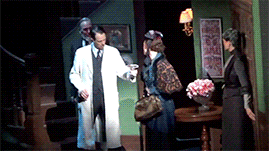



The time when Higgins’ house wouldn’t stop spinning on the US tour!
#My Fair Lady#MFL#Laird Mackintosh#Shereen Ahmed#Henry Higgins#Higgins#Eliza Doolittle#Kevin Pariseau#Gayton Scott#Colonel Pickering#Hugh Pickering#Mrs Pearce#myfairladyedit#mfledit#musicaledit#theateredit#pureanonedits#Theater flubs are the best flubs
32 notes
·
View notes
Text
This post gave me the idea for a modern AU where Eliza Doolittle is rooming with an older couple, Higgins and Pickering, and keeping them up to date on whatever the latest memes and drama on social media are. Hell, maybe they're even still giving her lessons on professional diction, but then she uses that style of diction to talk about Xitter's latest trashy celebrity drama (in place of "come on Dover, move yer bloomin' arse" and the preceding gossip involving a family member and a spoonful of gin).
#shitpost#modern au#my fair lady#pygmalion#eliza doolittle#henry higgins#colonel pickering#george bernard shaw#bernard shaw
2 notes
·
View notes
Text

Today's daily male is Colonel Hugh Pickering from Pygmalion!
#daily male#colonel hugh pickering#colonel pickering#pygmalion#my fair lady#men#masculinity#mod howl#I take it personally that this is named after the myth and no one knows what I'm talking about when I mention the myth
6 notes
·
View notes
Text
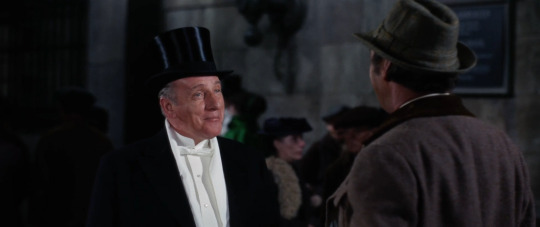

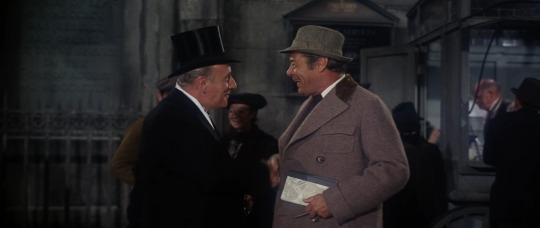

I came from India to meet you!
I was going to India to meet you!
They literally both read the other's work, decided to take a huge journey to meet the other one, coincidentally met each other, immediately fell in love, moved in together, and adopted a daughter the next morning.
You cannot tell me that is not the plot of My Fair Lady.
#I considered making the caption ''me and the bad bitch i pulled by being a bigot'' but my love of the ship won out over my hate of higgins#someone needs to remake my fair lady because so much about that movie sucks#like the choreography. and the song length. and the ending. and the choreography. and not having a teenager play Eliza. and the choreograph#i don't think Eliza is ever meant to be a teenager but her character makes more sense as a teenager#idk maybe it's just that i find my fair lady intolerable as a love story between eliza and henry#and the whole thing makes much more sense and is more appealing as the story of unexpectedly becoming a husband and father#(and then fucking it up bc you're a classist misogynist)#my fair lady#henry higgins#colonel pickering#santagno
6 notes
·
View notes
Text
Unveiling Social Constructs: A Review of "Pygmalion" by Bernard Shaw

Bernard Shaw's "Pygmalion" is a thought-provoking play that transcends time, weaving together themes of class, identity, and societal expectations with wit, humor, and insight. First performed in 1913, the play follows the transformative journey of Eliza Doolittle, a Cockney flower girl, who becomes the subject of a bet between the phonetics professor Henry Higgins and Colonel Pickering. As Higgins attempts to mold Eliza into a refined lady through speech lessons, "Pygmalion" explores the intricacies of language, social mobility, and the power dynamics inherent in class distinctions.
At its core, "Pygmalion" challenges the notion of fixed social hierarchies and underscores the arbitrary nature of class distinctions. Shaw deftly exposes the absurdity of equating social status with inherent worth, presenting characters whose true value lies not in their birthright but in their character and individual agency. Through Eliza's transformation from a humble flower girl to a confident, independent woman, Shaw highlights the fluidity of identity and the potential for self-determination, regardless of one's social origins.
Moreover, "Pygmalion" is a testament to Shaw's mastery of dialogue and character development. The play is replete with sharp, witty exchanges that not only entertain but also serve to illuminate the complexities of human nature and interpersonal relationships. From Higgins's acerbic wit to Eliza's spirited defiance, Shaw creates characters that are as memorable as they are multidimensional, inviting audiences to empathize with their struggles and triumphs.
One of the most compelling aspects of "Pygmalion" is its exploration of the power dynamics inherent in language and communication. Shaw exposes how linguistic norms and accents serve as markers of social status, relegating those who speak differently to the margins of society. Through Higgins's efforts to "improve" Eliza's speech, the play raises important questions about agency, autonomy, and the ethics of linguistic imperialism, prompting audiences to reflect on the ways in which language shapes our perceptions of ourselves and others.
Furthermore, "Pygmalion" is a richly layered work that rewards careful analysis and interpretation. Shaw infuses the play with symbolism and allegory, drawing parallels between Eliza's transformation and the myth of Pygmalion, the sculptor who fell in love with his own creation. By framing Eliza's journey as a modern-day retelling of this myth, Shaw invites audiences to consider the ways in which art, identity, and desire intersect in shaping human experience.
In conclusion, "Pygmalion" is a timeless masterpiece that continues to resonate with audiences for its incisive social commentary, vibrant characters, and sparkling wit. Shaw's exploration of class, identity, and language remains as relevant today as it was over a century ago, inviting audiences to question societal norms and challenge the status quo. With its enduring relevance and timeless appeal, "Pygmalion" stands as a testament to Shaw's genius as a playwright and his unwavering commitment to social justice and human dignity.
Bernard Shaw's "Pygmalion" is available in Amazon in paperback 12.99$ and hardcover 19.99$ editions.
Number of pages: 188
Language: English
Rating: 9/10
Link of the book!
Review By: King's Cat
#Pygmalion#Bernard Shaw#Play#Drama#Comedy#Social satire#Class#Identity#Transformation#Language#Speech#Phonetics#Eliza Doolittle#Henry Higgins#Colonel Pickering#Cockney accent#Social mobility#Self-improvement#Societal norms#Social hierarchy#Linguistic imperialism#Autonomy#Agency#Equality#Social critique#Character development#Feminism#Independence#Empowerment#Allegory
0 notes
Text
I knew that Dr. Early from Emergency reminded me of someone, and it didn't dawn on me until today that he's like Colonel Pickering from My Fair Lady
0 notes
Text

Do you think this guy has any idea what kind of crazy drama is unfolding, or does he just think Stolas ordered some fancy bath salts or something.
#helluva boss#stolas#look my way#i think as a fandom we need to name this guy#i vote colonel pickering
168 notes
·
View notes
Text
unfortunately I’m rediscovering that a lot of my fictional interests have traces of their roots in My Fair Lady 1964
#the dr Doolittle to 20000 leagues to my fair lady to Audrey Hepburn fan pipeline#my literary/film tastes were set up by pbs and schools that showed 60s movies in after hours programs#I’m rewatching it tonight at home and somehow it’s making me want to go see Eileen 2023 in theaters again even more than I did earlier today#something that hasn’t changed at all with my perspective is that everyone is sooooo crazy mean to Eliza. like I can’t stand it.#fuck everyone in this house. I respect YOU colonel Pickering.#my fair lady (1964)
5 notes
·
View notes
Text
It is my opinion that in every adaptation of Pygmalion, even the ones where Higgins and Eliza end up together, Professor Higgins and Colonel Pickering are gay. Every line about him is like "you've never liked women" and every other line he says is like "God, Pickering, women are boring and you dance much better than her." He describes the pair of them as "confirmed bachelors" at one point, how much clearer can this get?
#i have been reading and watching and writing about pygmalion for the last few hours#and this is what i come up with#unrelated to my actual essay#pygmalion#george bernard shaw#pygmalion (1938)#my fair lady
22 notes
·
View notes
Note
Thea which of MS and DT would you most want to see in Pygmalion?
I think Professor Higgins is such a Michael Sheen role (though I’ve yet to find a single role that couldn’t be equally well-played by both of them). In an ideal world, one would convince DT to do Colonel Pickering even though it’s too small of a role and maybe they could gay it up a little.
14 notes
·
View notes
Photo
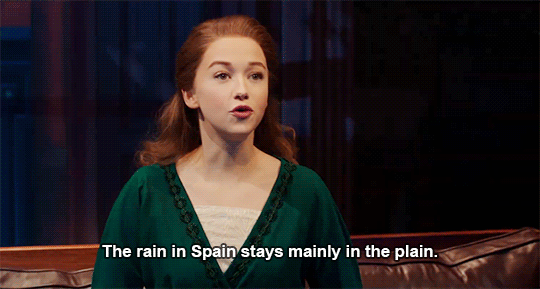
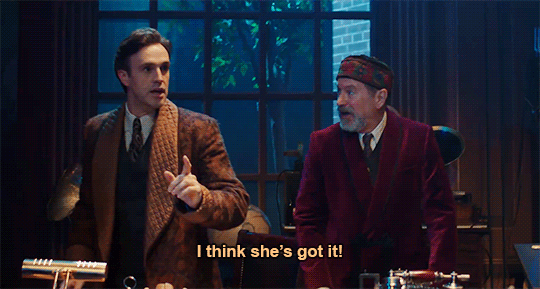
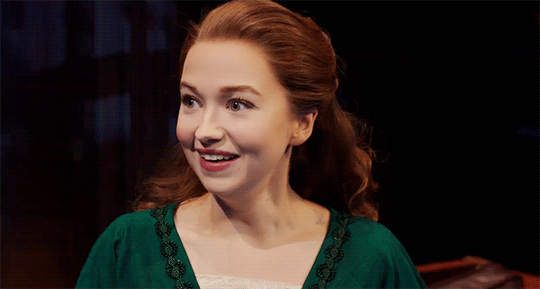
By George, she’s got it!
MY FAIR LADY UK TOUR (2022)
#My Fair Lady#MFL#Eliza Doolittle#Henry Higgins#Higgins#Colonel Pickering#Hugh Pickering#myfairladyedit#mfledit#musicaledit#theateredit#broadwaydaily#Charlotte Kennedy#Michael Xavier#Michael D Xavier#John Middleton#elizadoolittleedit#henryhigginsedit#pureanonedits#They're so CUTE I hate them#And I so badly want to see them in the whole show.#somebody pls :P
40 notes
·
View notes
Text
If you liked [inside no 9 episode] watch [film] : a guide. Part 2
If you liked ‘Wuthering Heist’, consider:
- Mon Oncle (1958). Genial, bumbling Monsieur Hulot loves his top-floor apartment in a grimy corner of the city, and cannot fathom why his sister's family has moved to the suburbs.
- A Night in the Show (1915). A man tries to find a seat for a show, while another man harasses both patrons and performers.
- Carry on Spying (1964). The dastardly organisation STENCH (Society for the Total Extinction of Non-Conforming Humans) is in possession of the secret Formula X, and its clear that the British secret service must do something.
- The Lavender Hill Mob (1951). Henry Holland is a fussy supervisor who oversees gold bullion deliveries to the bank in which he works. Secretly, he is plotting to steal a load of bullion and retire early, but he cannot figure out a way to smuggle it out of the country.
If you liked ‘Last Night of the Proms’, consider:
- Eat the Rich (1987). Terrorists and a rude waiter attack a politician and take over an exclusive London club.
- The Last Supper (1995). A group of students meet every Sunday and invite a guest to discuss various topics. When one of them ends up killing a guest because of his views, they decide to rid society of such people.
- The Cook, the Thief, His Wife & Her Lover (1987). A gang leader's wife starts an affair with a bookseller who regularly visits her husband's restaurant. However, things complicate when she, her lover, a thief and a cook come together.
- In The Loop (2009). During an interview, British Cabinet Minister Simon Foster delivers an off-the-cuff remark Profane political spin doctor Malcolm Tucker tries to cover up Foster's faux pas, but the ill-conceived comment is picked up by a warmongering American official.
If you liked ‘The Riddle of the Sphinx’ consider:
- Pygmalion (1938). When linguistics professor Henry Higgins boasts that he can pass off Cockney flower girl Eliza Doolittle as a princess with only six months' training, Colonel George Pickering takes him up on the bet.
- The Game (1997). Nicholas Van Orton is a successful banker who keeps mostly to himself. When his estranged brother Conrad returns on his birthday with an odd gift - participation in a personalized, real-life game - Nicholas reluctantly accepts.
If you liked ‘Séance time’, consider:
- Ghostwatch (1992). The BBC gives over a whole evening to an 'investigation into the supernatural'
- Talk to Me (2023). When a group of friends discover how to conjure spirits with an embalmed hand, they become hooked on the new thrill and high-stakes party game - until one of them goes too far and unleashes terrifying supernatural forces.
- Hereditary (2018). When the matriarch of the Graham family passes away, her daughter and grandchildren begin to unravel cryptic and increasingly terrifying secrets about their ancestry, trying to outrun the sinister fate they have inherited.
- Ghost Stories (2017). Professor Phillip Goodman devotes his life to exposing phony psychics and fraudulent supernatural shenanigans. His skepticism soon gets put to the test when he receives news of three chilling and inexplicable cases.
- Borley Rectory (2017). In 1937, leading paranormal investigator Harry Price is given an opportunity to investigate the most haunted house in England, the infamous Borley Rectory, where he hopes to discover the truth behind the hauntings that have plagued the property.
12 notes
·
View notes
